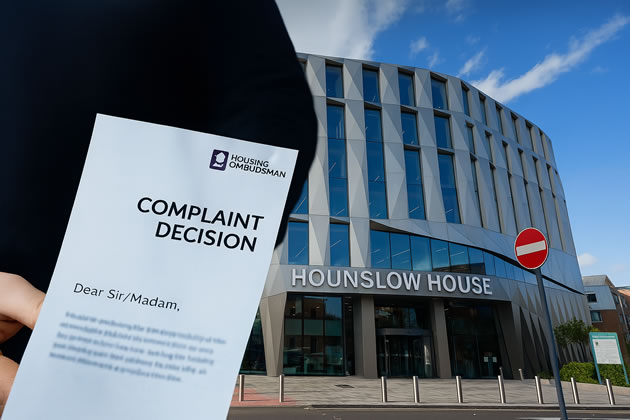Watchdog Blasts Hounslow Over Housing for Disabled Child
Report accused the borough of 'silent severe maladministration'

The council accepted the Ombudsman's conclusion. Picture: AI generated
September 25, 2025
Hounslow Council has been called out by the housing watchdog over its handling of a case involving a disabled child.
The borough is one of six landlords listed in a report calling out “silent severe maladministration”, and the only London borough included.
This relates to a case where Hounslow Council left a disabled child and her family in a home undergoing major adaptations with long delays, disruption and little information. The works were intended to support the disabled child.
The resident agreed to a schedule of building work around a year before it was due to start, however despite confirming this date, the council failed to begin on time. From that point, there was no contact with the resident until they raised a complaint.
The work covered the entire ground floor of the family home, however two weeks in, contractors enlisted by Hounslow Council withdrew due to a payment dispute with the local authority. Despite this, the resident was never told why the work had stopped.
It took seven months for adaptations to be completed, but there was an additional ten months of identifying and fixing defects and quality issues. As such, the family had to live with uncertainty for over 18 months.
The Housing Ombudsman found that during this entire period, the disabled child’s needs were not properly considered, nor was a risk assessment ever undertaken.
The watchdog described this as “silent severe maladministration”, whereby less attention is paid to the complaints than other damp, mould or repair complaints, despite being equally significant.
Hounslow Council says it fully accepts the Ombudsman’s findings, and is sorry for the distress caused to the resident. Cllr Tom Bruce, Deputy Leader of Hounslow Council and Cabinet Member for Assets, Regeneration and Development, said: “We have identified better working practices in the way we communicate with residents around adaptations. This includes before the start of such works, during, and, where appropriate, after they are completed.
“As a council we are committed to enhancing services and communication with residents. Efforts are focused on addressing the root causes of complaints and finding better ways for early interventions to prevent severe problems.
“Additionally, new methods are being developed for residents to regularly and constructively share their views to influence service delivery. We acknowledge the need for improvement and appreciate our residents holding us accountable when they are dissatisfied.”
The report also states that temporary moves should be considered in cases similar to this, particularly when adaptations are extensive or disruptive. It advises landlords to ensure there is clear communication with the resident throughout the process.
Richard Blakeway, Housing Ombudsman, said, “This report illustrates the breadth of responsibilities for social landlords. It shows how pivotal their role is for social infrastructure and how they are juggling many priorities.
“Inevitably, when things go wrong, it means the impact can be greater. These cases could be termed ‘silent’ severe maladministration because they receive less attention. But they are no less important.
“While each area is distinctly different, the root causes of some service failings are similar and reminiscent of more visible complaint areas. This includes erratic knowledge and information management, inaction, and patchy communication.
“Landlords should not lose sight of some of the other core components of its housing offer with new regulations and legislation coming in.”
Philip James Lynch - Local democracy reporter
Like Reading Articles Like This? Help Us Produce More This site remains committed to providing local community news and public interest journalism. Articles such as the one above are integral to what we do. We aim to feature as much as possible on local societies, charities based in the area, fundraising efforts by residents, community-based initiatives and even helping people find missing pets. We’ve always done that and won’t be changing, in fact we’d like to do more. However, the readership that these stories generates is often below that needed to cover the cost of producing them. Our financial resources are limited and the local media environment is intensely competitive so there is a constraint on what we can do. We are therefore asking our readers to consider offering financial support to these efforts. Any money given will help support community and public interest news and the expansion of our coverage in this area. A suggested monthly payment is £8 but we would be grateful for any amount for instance if you think this site offers the equivalent value of a subscription to a daily printed newspaper you may wish to consider £20 per month. If neither of these amounts is suitable for you then contact info@neighbournet.com and we can set up an alternative. All payments are made through a secure web site. One-off donations are also appreciated. Choose The Amount You Wish To Contribute. If you do support us in this way we’d be interested to hear what kind of articles you would like to see more of on the site – send your suggestions to the editor. For businesses we offer the chSeptember 25, 2025. For £30 plus VAT per month you will be the designated sponsor of at least one article a month with your logo appearing if supplied. If there is a specific community group or initiative you’d like to support we can make sure your sponsorship is featured on related content for a one off payment of £50 plus VAT. All payments are made through a secure web site. |